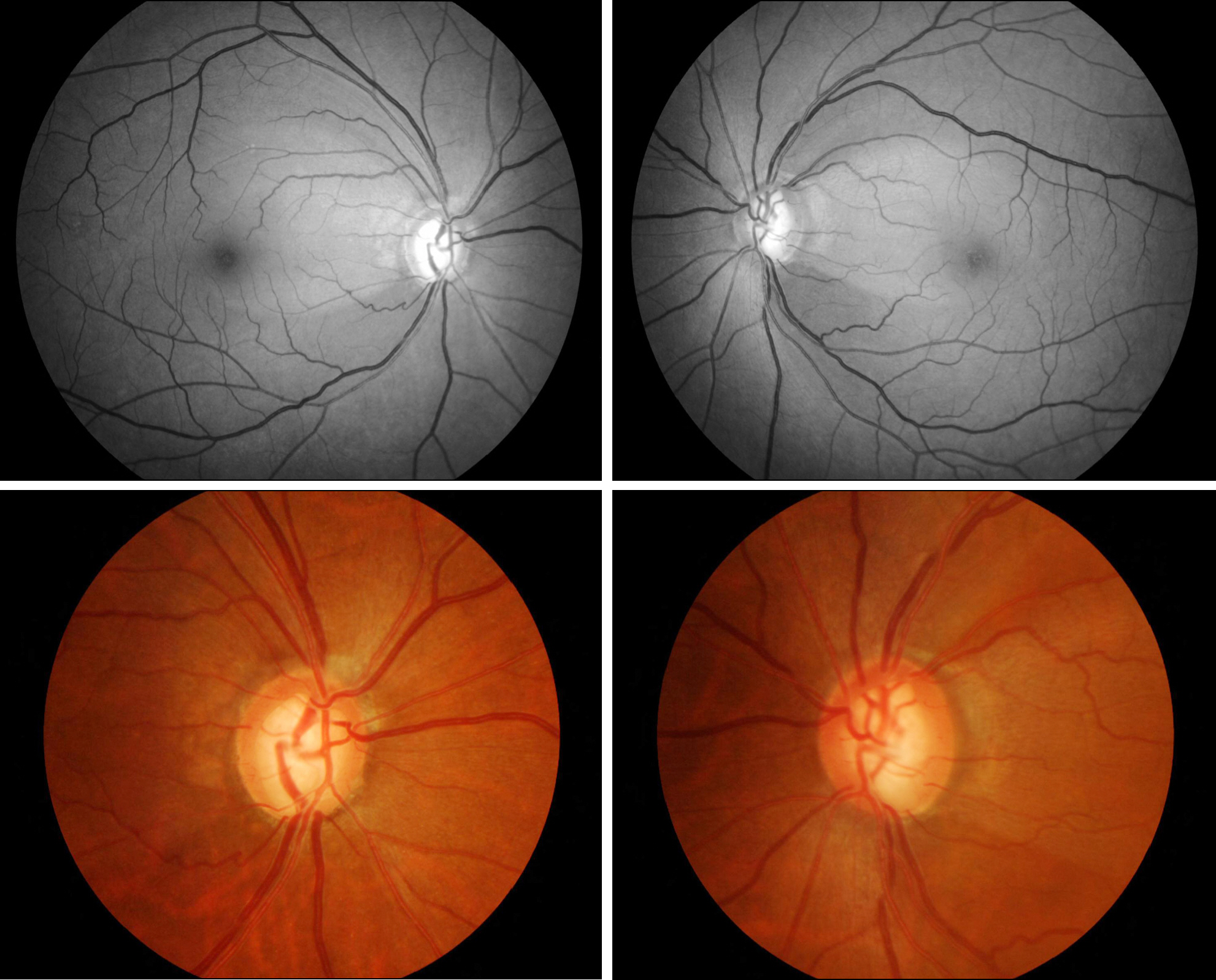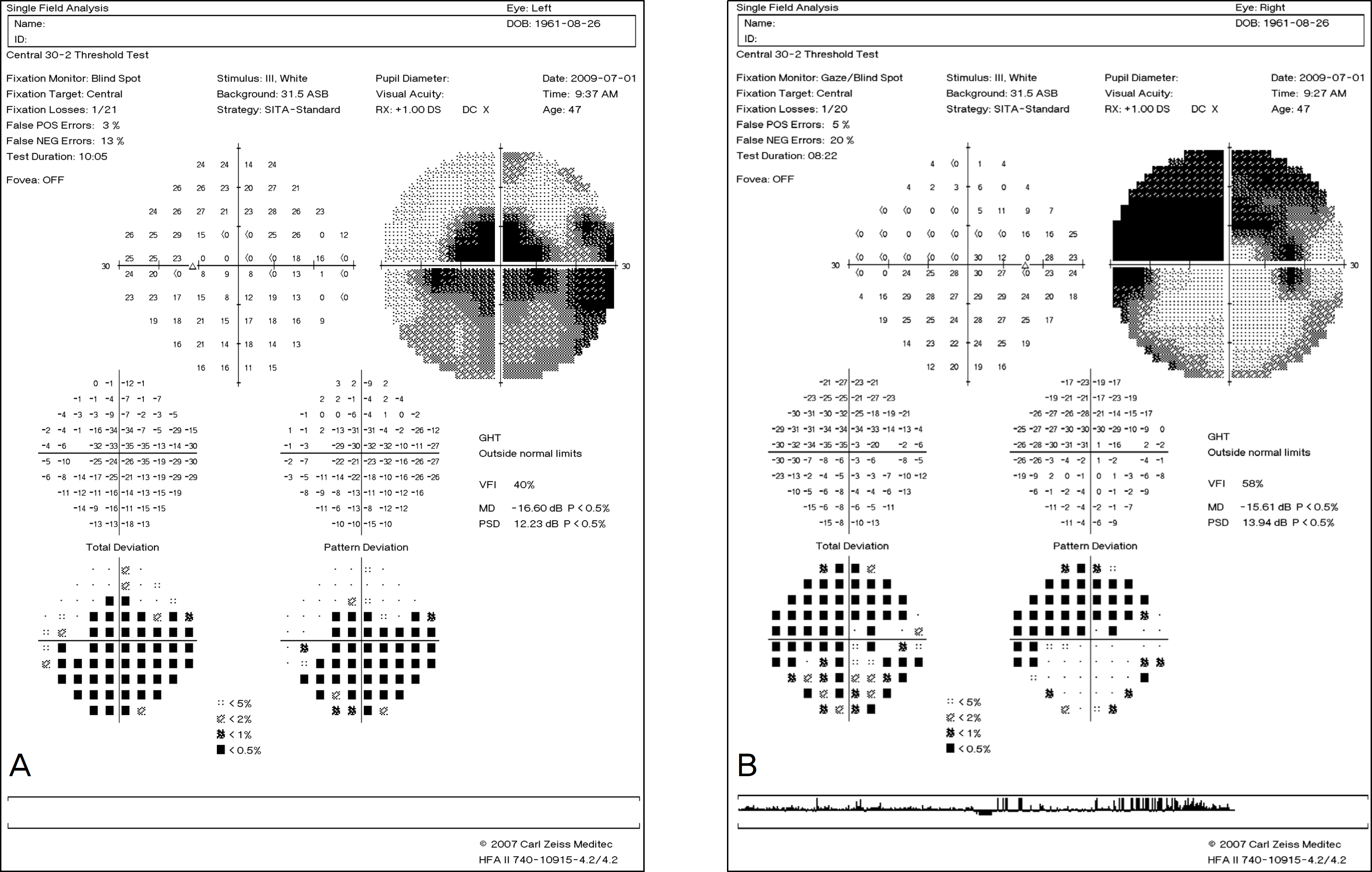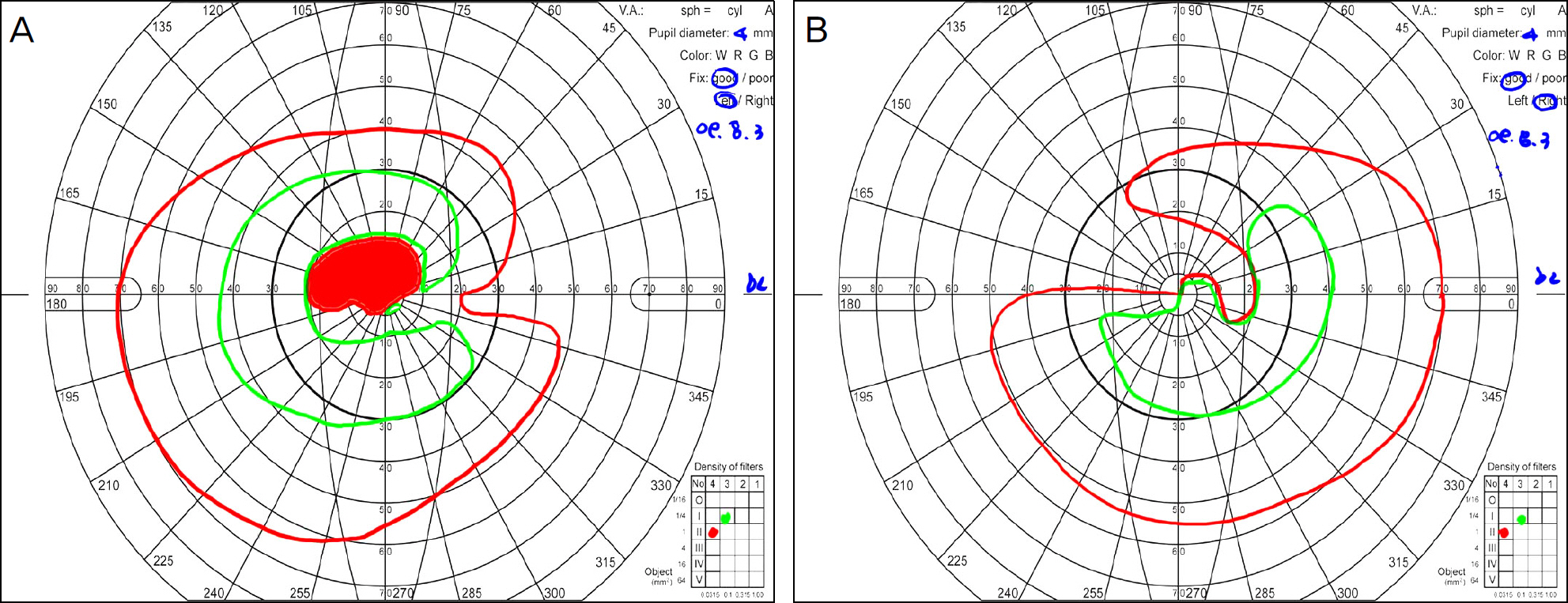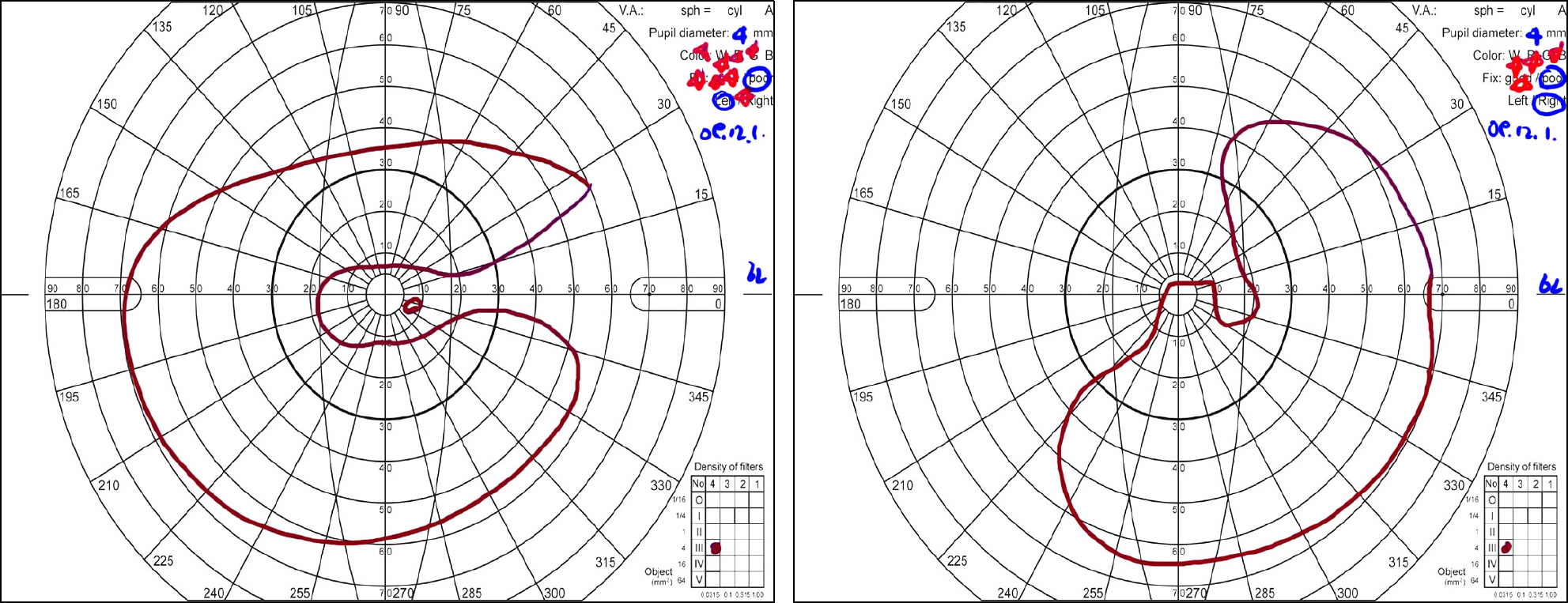J Korean Ophthalmol Soc.
2011 Jan;52(1):122-127. 10.3341/jkos.2011.52.1.122.
Leber's Hereditary Optic Neuropathy in a Patient Diagnosed With Normal Tension Glaucoma: A Case Report
- Affiliations
-
- 1Department of Ophthalmology, Seoul National University College of Medicine, Seoul, Korea. ophjun@gmail.com
- 2Seoul Artificial Eye Center, Seoul National University Hospital Clinical Research Institute, Seoul, Korea.
- 3Department of Ophthalmology, Inje University Ilsan Paik Hospital, Goyang, Korea.
- KMID: 2214149
- DOI: http://doi.org/10.3341/jkos.2011.52.1.122
Abstract
- PURPOSE
Leber's hereditary optic neuropathy (LHON) is caused by point mutations in mitochondrial DNA. The authors report a case of a middle-aged man with genetically confirmed LHON, combined with bilateral normal tension glaucoma (NTG).
CASE SUMMARY
A 48-year-old man presented with complaints of decreased visual acuity in his left eye. His corrected visual acuity was 20/16 in the right eye and 20/63 in the left eye. The fundus photographs revealed a bilateral, superotemporal and inferotemporal retinal nerve fiber layer defect, corresponding to his visual field defect. The patient was diagnosed with bilateral NTG. After 2 months, the patient's corrected visual acuity in the left eye worsened to counting fingers and a central visual field defect was noticed in the Humphrey visual field test in the left eye. At 4 months after the initial visit, his corrected visual acuity in the right eye became 20/100, and the Goldmann visual field test demonstrated cecocentral scotoma. The fundus photographs showed a papillomacular bundle defect in his left eye. At 7 months after the initial visit, his visual acuity was hand movement in the right eye and a finger count in the left eye. A series of LHON gene mutation tests revealed a 11778 mitochondrial gene mutation, and the patient was diagnosed with LHON.
CONCLUSIONS
Proper diagnosis of LHON might be disturbed by atypical manifestation of other optic nerve diseases, such as glaucoma. Therefore, suspecting LHON and checking for gene mutations as part of the work-up in patients with bilateral optic neuropathy is critical.
MeSH Terms
Figure
Reference
-
References
1. Leber T. Ueber hereditare und congenital angelegte Sehnervenleiden. Alberecht Von Graefes Arch Klin Exp Ophtalmol. 1871; 17:248–91.2. Wallace DC, Singh G, Lott MT. Mitochondrial DNA mutation associated with Leber's hereditary optic neuropathy. Science. 1988; 242:1427–30.
Article3. Hwang JM, Jung YC. The etiology of optic neuropathy. J Korean Ophthalmol Soc. 1999; 40:1078–83.4. Hwang JM, Park HW. A mitochondrial mutation in Leber's hereditary optic neuropathy. J Korean Ophthalmol Soc. 1995; 36:153–8.5. Quigley HA, Addicks EM, Green WR. Optic nerve damage in human glaucoma. III. Quantitative correlation of nerve fiber loss and visual field defect in glaucoma, ischemic neuropathy, papilledema, and toxic neuropathy. Arch Ophthalmol. 1982; 100:135–46.6. Von Graefe A. Über die iridectomie bei glaucom und über den glaucoma usen prozess. Albrecht von Graefes Arch Ophthalmol. 1857; 3:456–650.7. Choe YJ, Hong YJ. The prevalence of glaucoma in Korean careermen. J Korean Ophthalmol Soc. 1993; 34:153–8.8. Kwak HW, Joo MJ, Yoo JH. The significance of fundus photography without mydriasis during health mass screening. J Korean Ophthalmol Soc. 1997; 38:1585–9.9. Newman NJ, Lott MT, Wallace DC. The clinical characteristics of pedigrees of Leber's hereditary optic neuropathy with the 11778 mutation. Am J Ophthalmol. 1991; 111:750–62.
Article10. Lauer SA, Ackerman J, Sunness J, et al. Leber's optic atrophy with myopia masquerading as glaucoma: case report. Ann Ophthalmol. 1985; 17:146–8.11. Opial D, Boehnke M, Tadesse S, et al. Leber's hereditary optic neuropathy mitochondrial DNA mutations in normal-tension glaucoma. Graefes Arch Clin Exp Ophthalmol. 2001; 239:437–40.
Article12. Mashima Y, Kimura I, Yamamoto Y, et al. Optic disc excavation in the atrophic stage of Leber's hereditary optic neuropathy: comparison with normal tension glaucoma. Graefes Arch Clin Exp Ophthalmol. 2003; 241:75–80.
Article13. Nikoskelainen E, Hoyt WF, Nummelin K. Ophthalmoscopic findings in Leber's hereditary optic neuropathy. II. The fundus findings in the affected family members. Arch Ophthalmol. 1983; 101:1059–68.14. Hwang JM, Chang BL, Park SS. Clinical Manifestations of Leber's Hereditary Optic Neuropathy with 11778 mitochondrial DNA Mutation in Koreans. J Korean Ophthalmol Soc. 2000; 41:1775–81.15. Weiner NC, Newman NC, Lessell S, et al. Atypical Leber's hereditary optic neuropathy with molecular confirmation. Arch Neurol. 1993; 50:470–3.
Article
- Full Text Links
- Actions
-
Cited
- CITED
-
- Close
- Share
- Similar articles
-
- Leber's Hereditary Optic Neuropathy in Two Brothers of a Family
- Clinical Manifestations of Leber's Hereditary Optic Neuropathy with 11778 mtDNA Mutation
- A Mitochondrial Mutation in Leber's Hereditary Optic Neuropathy
- A Case of Leber Hereditary Optic Neuropathy Showing Optic Disc Hyperfluorescence
- Leber's Hereditary Optic Neuropathy with Dystonia Caused by mtDNA 11778 Mutation






